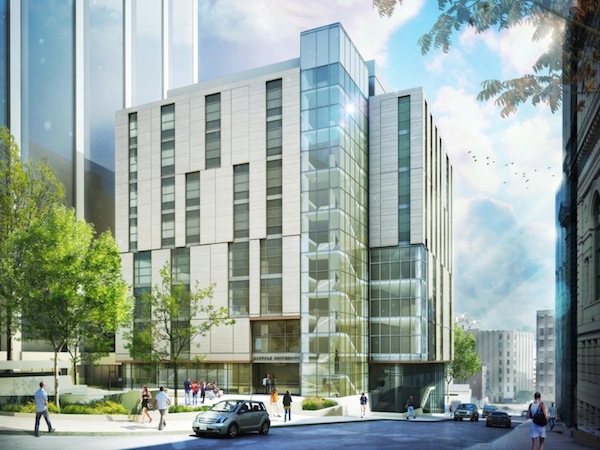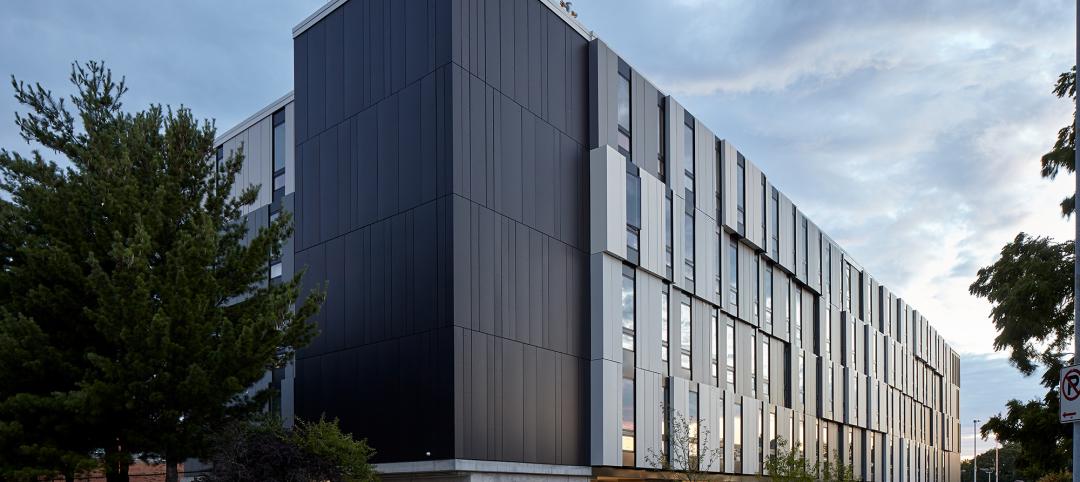The Boston Redevelopment Authority board yesterday unanimously approved Suffolk University’s plans to move forward with a new campus building at 20 Somerset St. that will feature general-use and science classrooms, a light-filled cafeteria/function space, and indoor and outdoor lounging areas.
The BRA determined that the building is in accord with the University’s Master Plan and that its impacts – which include relocating all academic classrooms from the residential part of Beacon Hill – will benefit the neighborhood. The University will now work with city, state, and preservation officials to finalize the design for the $62 million building and move forward with construction.
“This building will provide the flexible academic facilities essential for today’s learning and teaching environment,” said Suffolk University President James McCarthy. “At the same time, it shows the value of partnering with neighbors, elected officials and city agencies to find solutions that benefit all.”
The sleek new building, expected to open in summer 2015, will encompass 112,000 square feet in 10 floors, two of them partially or fully below grade. There will be four floors each of general-education and science classrooms of various sizes, providing 1,100 classroom seats. It also will include student support services.
The neighborhood will benefit as active use is restored at the site of the old MDC headquarters, which will be replaced with a building designed to be respectful of its surroundings. The new building will be adjacent to open space, and the state-owned Roemer Plaza will be landscaped to provide an inviting area for students and neighbors to gather.
The University will refit the Donahue and Archer buildings for office space and eventually sell its Fenton Building and annex on Derne Street and the Ridgeway building on Cambridge Street as part of its plan to relocate classrooms.
“Through institutional planning we’re encouraging colleges and universities to look at their assets strategically,” said Mayor Thomas M. Menino. “Suffolk University’s decision to consolidate classroom space in a new building closer to the core of their campus benefits the institution and their neighbors in Beacon Hill.”
The BRA’s approval of the redesigned project is the result of a close collaboration among Suffolk University, elected officials, and a community task force made up of members from surrounding neighborhoods, as well as with its neighbors on Beacon Hill and representatives of the abutting Garden of Peace.
"This is a textbook case of neighbors, elected officials, and the University coming together to craft a project that benefits all," said John Nucci, the University’s vice president for Government and Community Affairs. “We listened very closely to everyone involved, and the result is that we now all agree that this project will be an asset to Suffolk University, Beacon Hill, and the whole area for decades to come.”
The University is working with NBBJ on the design scheme.
Features of the 20 Somerset project include:
- Create more than 300 new construction jobs
- Seek LEED Silver certification for a building to be designed and constructed according to high standards for green design and sustainability
- Relocation of all classrooms and a cafeteria currently located within the residential area of Beacon Hill
- Return an active use to a now-vacant property
- Create a vibrant new public space for use by all through improvements to Roemer Plaza
- Maintain the existing building setback from the adjacent Garden of Peace and provide an appropriate building façade facing the Garden
- Maintain the existing building height, thus producing no new shadow on the Garden of Peace
About Suffolk University
Suffolk University, located in historic downtown Boston, with an international campus in Madrid, is a student-centered institution distinguished by excellence in education and scholarship. Suffolk University offers a wide range of undergraduate and graduate programs in more than 90 areas of study. Its mission is to empower graduates to be successful locally, regionally, and globally.
Related Stories
Curtain Wall | Aug 15, 2024
7 steps to investigating curtain wall leaks
It is common for significant curtain wall leakage to involve multiple variables. Therefore, a comprehensive multi-faceted investigation is required to determine the origin of leakage, according to building enclosure consultants Richard Aeck and John A. Rudisill with Rimkus.
MFPRO+ News | Aug 14, 2024
Report outlines how Atlanta can collaborate with private sector to spur more housing construction
A report by an Urban Land Institute’s Advisory Services panel, commissioned by the city’s housing authority, Atlanta Housing (AH), offered ways the city could collaborate with developers to spur more housing construction.
Adaptive Reuse | Aug 14, 2024
KPF unveils design for repositioning of Norman Foster’s 8 Canada Square tower in London
8 Canada Square, a Norman Foster-designed office building that’s currently the global headquarters of HSBC Holdings, will have large sections of its façade removed to create landscaped terraces. The project, designed by KPF, will be the world’s largest transformation of an office tower into a sustainable mixed-use building.
Sustainability | Aug 14, 2024
World’s first TRUE Zero Waste for Construction-certified public project delivered in Calif.
The Contra Costa County Administration Building in Martinez, Calif., is the world’s first public project to achieve the zero-waste-focused TRUE Gold certification for construction. The TRUE Certification for Construction program, administered by Green Business Certification Inc. (GBCI), recognizes projects that achieve exceptional levels of waste reduction, reuse, and recycling.
Modular Building | Aug 13, 2024
Strategies for attainable housing design with modular construction
Urban, market-rate housing that lower-income workers can actually afford is one of our country’s biggest needs. For multifamily designers, this challenge presents several opportunities for creating housing that workers can afford on their salaries.
University Buildings | Aug 12, 2024
Planning for growing computer science programs
Driven by emerging AI developments and digital transformation in the business world, university computer science programs are projected to grow by nearly 15% by 2030.
Energy Efficiency | Aug 9, 2024
Artificial intelligence could help reduce energy consumption by as much as 40% by 2050
Artificial intelligence could help U.S. buildings to significantly reduce energy consumption and carbon emissions, according to a paper by researchers at the Lawrence Berkeley National Laboratory.
Sponsored | Healthcare Facilities | Aug 8, 2024
U.S. healthcare building sector trends and innovations for 2024-2025
As new medicines, treatment regimens, and clinical protocols radically alter the medical world, facilities and building environments in which they take form are similarly evolving rapidly. Innovations and trends related to products, materials, assemblies, and building systems for the U.S. healthcare building sector have opened new avenues for better care delivery. Discussions with leading healthcare architecture, engineering, and construction (AEC) firms and owners-operators offer insights into some of the most promising directions. This course is worth 1.0 AIA/HSW learning unit.
Office Buildings | Aug 8, 2024
6 design trends for the legal workplace
Law firms differ from many professional organizations in their need for private offices to meet confidentiality with clients and write and review legal documents in quiet, focused environments
Data Centers | Aug 8, 2024
Global edge data center market to cross $300 billion by 2026, says JLL
Technological megatrends, including IoT and generative AI, will require computing power to be closer to data generation and consumption, fueling growth of edge IT infrastructure, according to a new JLL report.

















